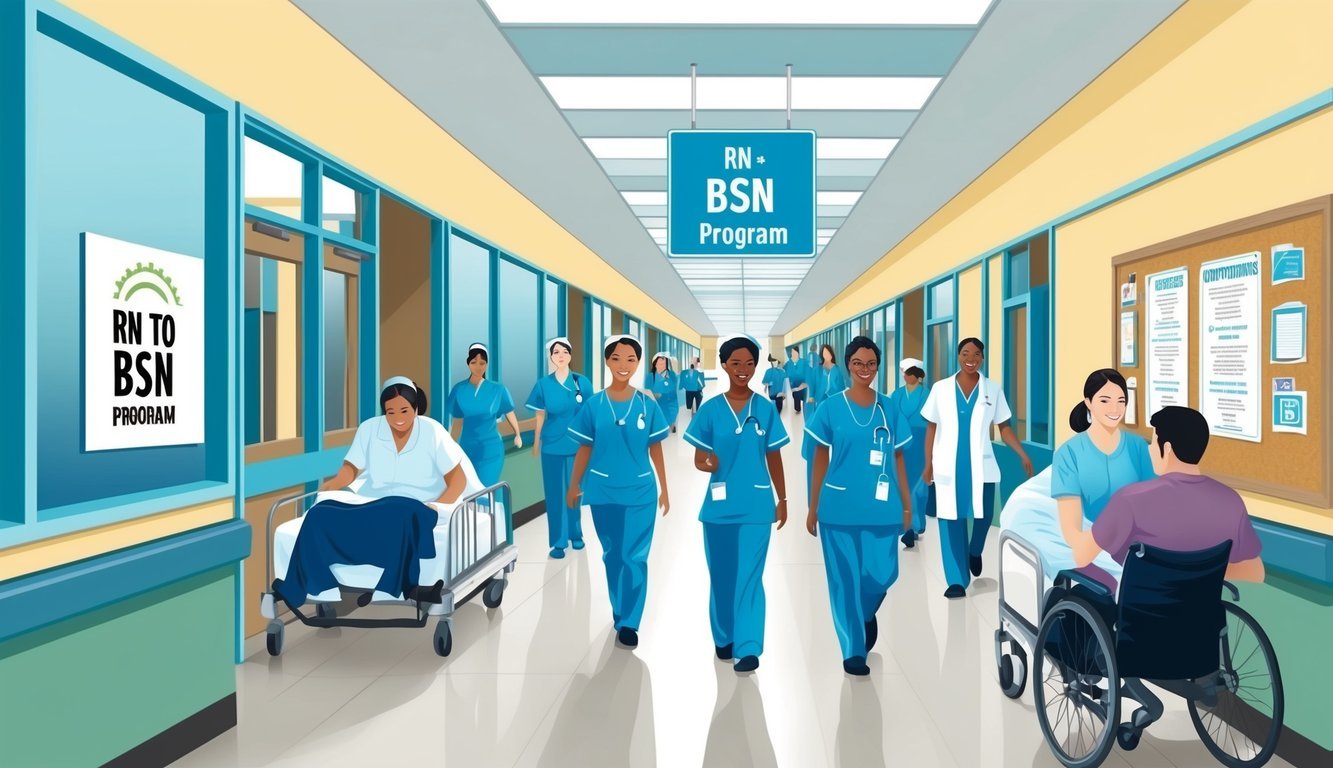If you’re a registered nurse looking to advance your career, you may be considering an RN to BSN program. The easiest RN to BSN programs typically offer flexible schedules, streamlined coursework, and high acceptance rates, making the transition as smooth as possible for busy professionals like you.
These programs are designed to build on your existing nursing knowledge and experience while addressing current healthcare trends and leadership skills.
With many institutions offering online options, you can study at your own pace.
Programs such as those at WGU not only facilitate quicker graduation times through redesigned formats but also help you manage costs by charging tuition per term instead of per credit.
This can be a game changer for your educational journey.
As you explore your options, consider what features are most important to you—whether it’s affordability, duration, or support services.
By selecting the right RN to BSN program, you can enhance both your qualifications and your career potential in the nursing field.
For more insight into various programs, check out resources like Nurse.org and Forbes Advisor.
Understanding RN to BSN Programs
RN to BSN programs play a crucial role in enhancing nursing education and practice.
They offer a pathway for registered nurses to advance their academic credentials and improve their professional skills, aligning with the evolving standards of healthcare.
Evolution of Nursing Education
Nursing education has advanced significantly over the years.
Initially, nursing training focused primarily on practical skills, often provided through hospital-based programs.
As the complexity of healthcare settings increased, so did the need for more comprehensive education.
Today, you can pursue a Bachelor of Science in Nursing (BSN) through various formats, including online RN to BSN programs.
This shift has been driven by evidence-based practice, which emphasizes the importance of advanced knowledge in improving patient outcomes.
Many institutions now recognize that higher education leads to better nursing practices.
Consequently, numerous ADN to BSN programs now incorporate modern teaching methods and technology to better prepare you for the demands of the healthcare industry.
Benefits of Advancing from RN to BSN
Transitioning from an RN to a BSN offers numerous advantages.
Firstly, it enhances your career prospects.
Employers increasingly prefer BSN-prepared nurses for leadership and management roles due to their broader scope of understanding in healthcare.
Additionally, a BSN degree can lead to higher earning potential.
Research indicates that BSN holders often command salaries that exceed those of their ADN counterparts.
Furthermore, obtaining a BSN equips you with skills in evidence-based practice and critical thinking, essential in addressing contemporary healthcare challenges.
The curriculum prepares you not only for clinical practice but also for roles in education, administration, and public health.
Overview of RN-to-BSN Curriculum
RN-to-BSN programs typically cover a diverse curriculum tailored for working nurses.
Courses often include subjects such as healthcare policy, nursing research, and community health.
This education provides a well-rounded view of nursing’s role within the broader healthcare system.
You may also encounter courses focusing on leadership, ethics, and cultural competency.
These are crucial as the nursing profession evolves to meet the needs of diverse populations.
Most programs culminate in a capstone project or practicum, allowing you to apply what you’ve learned in a real-world setting.
This hands-on experience reinforces your skills and prepares you for advanced practice roles.
Key Components of BSN Programs
In pursuing a Bachelor of Science in Nursing (BSN), you will encounter several critical components that shape your educational experience.
Understanding these components is essential for navigating your studies effectively and preparing for your nursing career.
Accreditation Standards
Accreditation ensures that your BSN program meets established educational quality benchmarks.
Programs are typically accredited by recognized bodies such as the Commission on Collegiate Nursing Education (CCNE) and are often required to align with the AACN Essentials.
Accreditation includes:
- Institutional Accreditation: Validates the overall quality of the institution.
- Programmatic Accreditation: Focuses specifically on nursing programs to assure their adherence to professional standards.
Enrolling in a CCNE accredited program ensures that your degree will be respected within the healthcare community and meets the requirements for taking the National Council Licensure Examination (NCLEX-RN).
Diverse Nursing Courses
BSN programs offer a rich array of nursing courses that cover various facets of healthcare.
Key topics often include:
- Nursing Informatics: Integrates technology and data management in patient care.
- Community Health Nursing: Emphasizes population health and preventive care strategies.
- Healthcare Policy: Discusses regulations and laws impacting nursing and patient care.
Additionally, you will explore Nursing Leadership and Management, equipping you with skills for supervisory roles.
These diverse courses provide a holistic view of nursing, ensuring you’re prepared for various responsibilities within a healthcare setting.
Clinical and Professional Requirements
Hands-on experience is a cornerstone of any BSN program.
Clinical experiences are designed to engage you in real-world nursing tasks under the supervision of experienced professionals.
Typically, students must complete a specified number of clinical hours, involving:
- Direct patient care in hospitals or community settings.
- Leadership roles during clinical rotations to build decision-making skills.
These clinical experiences are essential for applying theoretical knowledge in practical scenarios.
They also enhance your confidence and competence when entering the workforce, ensuring you are well-equipped to meet the demands of a nursing career.
Selecting the Right Program
Choosing the right RN to BSN program is crucial for your educational and career advancement.
You should consider the delivery format, flexibility, and admission standards to find the option that aligns with your needs.
Comparing Online and On-Campus Options
When selecting a program, you should assess whether an online or on-campus format suits your lifestyle.
Online RN to B.S.N. programs usually offer greater flexibility, allowing you to balance work and study.
These programs often utilize asynchronous courses, letting you complete assignments on your schedule.
On-campus programs may provide hands-on experiences and direct interaction with faculty and peers.
However, they typically have fixed schedules, which could conflict with your job.
Consider your learning preferences and lifestyle when making this decision.
Many accredited nursing school programs offer both options, allowing you to choose what works best for you.
Evaluating Flexibility and Course Delivery
Flexibility is a critical factor in your decision-making process.
Online classes often allow for distance learning, meaning you can study from anywhere with internet access.
Look for programs that offer flexible options, such as weekend classes or part-time enrollment, if you need a lighter workload.
Programs vary in their delivery methods; some may require synchronous attendance for lectures while others offer fully asynchronous coursework.
Make sure to evaluate which course delivery method aligns with your lifestyle and commitments.
To assist you, consider reviewing lists of the easiest online RN to BSN programs to find one that meets your needs.
Understanding Admission Standards
Admission requirements can vary significantly between programs.
Some schools may have high standards, such as minimum GPA thresholds or extensive nursing experience, while others boast more lenient criteria.
Investigate each program’s admission requirements to determine where you have the best chances of acceptance.
Additionally, consider financial aid options.
Many online programs provide information about scholarships or grants for nursing students.
Knowing the tuition rates and potential financial support can also help you make an informed choice.
Research and compare admission standards across multiple schools to ensure you find a program that fits both your academic profile and financial situation.
Institutional Profiles and Program Highlights
This section highlights various RN to BSN programs, emphasizing key features and success stories.
You’ll gain insights into notable offerings from specific institutions and learn about outcomes that resonate with prospective students.
Notable Programs and Their Features
Western Governors University (WGU) offers a competency-based model that allows you to progress at your own pace.
This flexibility can lead to quicker completion times, essential for working professionals.
University of Texas at El Paso provides an online RN to BSN program focused on practical training and patient outcomes.
The program is known for its high retention rates and support for transferring credits.
Purdue Global caters to adult learners with various transfer credit options, making it easier for you to join the program.
Its emphasis on quality education is backed by CCNE accreditation.
Grand Canyon University (GCU) offers a faith-based approach, integrating holistic nursing practices into the curriculum.
Lewis-Clark State College and Delta State University both emphasize community engagement and real-world experience, essential components for nursing professionals.
Case Studies: Success Stories and Outcomes
Cox College graduates frequently report high job placement rates.
Many alumni have transitioned into leadership roles within healthcare settings soon after completing the program.
The University of Central Florida highlights that its graduates earn an average salary significantly above the national average for RNs.
This reflects the program’s strong academic foundation and well-rounded curriculum.
Mississippi University for Women showcases stories of students who balanced work and study effectively, leveraging their RN to BSN program for career advancement.
Aspen University emphasizes its student support services, which have helped many finish their degrees in less than a year.
At the University of Texas at Arlington, many students graduated with confidence and skills that led to immediate employment upon completing the program.
The diverse experiences from these institutions exemplify the varying approaches to achieving success in the RN to BSN journey.
Career Impact and Opportunities

Pursuing an RN to BSN program can significantly enhance your career in nursing by opening up various pathways for advancement.
With a bachelor’s degree, you gain access to specialized roles, leadership opportunities, and a better understanding of healthcare systems.
Advancement in Healthcare Positions
Earning a BSN can elevate your position within the healthcare field.
Many employers now prefer or require a BSN for hiring and promotions, particularly for roles in management and specialized nursing.
- Higher Salary Potential: BSN-prepared nurses often earn more than their ADN counterparts. According to ZipRecruiter, BSN nurses can make upwards of $90K, compared to $75K for ADN nurses.
- Expanded Career Opportunities: With a BSN, you may qualify for roles such as nurse educator, clinical nurse leader, or nurse manager. Each of these positions emphasizes leadership, communication skills, and advanced nursing practice.
Obtaining recommendation letters from supervisors can also facilitate your ascent into these positions.
Specializations and Leadership Roles
The BSN curriculum often includes coursework in nursing management and advanced nursing practices.
This education equips you with leadership skills and specialized knowledge.
Consider these popular nursing specializations:
| Specialization | Focus Areas |
|---|---|
| Clinical Nurse Leader | Patient care coordination and quality improvement |
| Nursing Management | Leadership, budgeting, and team dynamics |
| Nurse Educator | Teaching nursing skills and mentoring students |
In these roles, you will utilize your enhanced nursing skills to lead teams, develop policy, and improve patient outcomes.
Online nursing degree programs offer the flexibility to study while working.
This allows you to advance your education without disrupting your professional experience.
This inclusiveness improves education equity within the field.
It enables nurses from diverse backgrounds to achieve higher qualifications.
The skills gained through a BSN program empower you to take on more significant responsibilities and contribute meaningfully to your healthcare organization.

